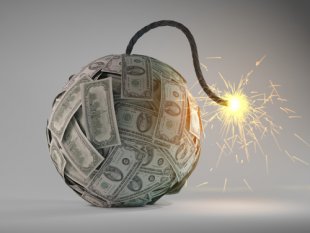
A new book chronicles the failure of the mainstream media–and most especially the business press, including publications like Forbes, Fortune, and The Wall Street Journal–to warn the public of the mortgage security crisis before it mushroomed into a full-blown financial catastrophe.
It may surprise some that at one point, the business press engaged in investigative-type journalism that held corporations and banking powers accountable for malfeasance and abuses of power.
In The Watchdog That Didn’t Bark, author Dean Starkman traces the full historical circle of the business press from its start as a platform for the financial elite who rewarded cozy journalists with access, through its mid-century transformation as a muckraking institution, and finally to its return to lap dog-style reporting around 2000 that rendered it a mouthpiece for the capitalist class.
Starkman explains that heavier regulation in the past allowed the business press to be more adversarial because they could uncover information on corporate corruption via government reports. As business became less regulated throughout the 1980s, publications could no longer rely on public channels for insider information, and resumed the sort of affable ties with the business sector they had at their start.
In addition to deregulation, Starkman articulates two other reasons why the business press grew so uncritical of their reporting subjects in the last decade: The “stampede of the middle class into the stock market,” which heightened demand for business insider intelligence among the public, and the changes induced by the Internet on the press’s traditional revenue generating models, which decimated funds for investigative reporting (an expensive undertaking) and made publishers skittish about upsetting advertisers.
The result was nearly a decade of investor-aimed news that relayed strategies for growth and flattered company CEOs with glowing profiles, but did little to raise red flags. Any reporting on the financial instruments and risky investments integral to the eventual crash was framed through a prism of stock market score keeping rather than one of endemic corruption.
Starkman doesn’t offer many suggestions on how the press can be reinvigorated as an adversarial institution, but in light of the media’s failure to illuminate the run up to disaster and its addiction to cheap access to Wall Street, it’s obviously something that needs to happen. But you know what they say about addicts: The first step is recognizing that there’s a problem.

More Stories
Navalny’s death used to hide western failures in Ukraine and their support for Israel’s genocide
Gifts from Gaza
Vulture capital circles over the corpse of Ukraine…